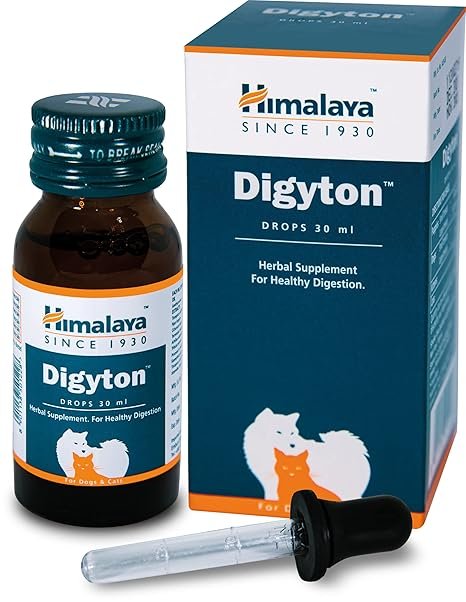Good digestion is crucial for the overall health and well-being of our pets. Just like humans, dogs and cats can experience digestive issues that affect their quality of life. Digyton, a popular digestion drop for dogs and cats, helps support healthy digestion and alleviates various gastrointestinal problems. This article will explore the uses, dosage, side effects, and warnings associated with Digyton to ensure your pet remains happy and healthy.
Uses of Digyton
Digyton is designed to support and improve the digestive health of dogs and cats. Here are some primary uses:
- Improves Digestive Function: Digyton helps enhance the overall digestive process, ensuring that pets properly absorb nutrients from their food.
- Relieves Gastrointestinal Discomfort: It alleviates symptoms like bloating, gas, and stomach discomfort, making pets feel more comfortable.
- Supports Enzyme Activity: The drops stimulate the activity of digestive enzymes, promoting efficient digestion.
- Manages Indigestion and Dyspepsia: Digyton is effective in managing conditions like indigestion and dyspepsia, which can cause discomfort and affect a pet’s appetite.
- Promotes Regular Bowel Movements: It helps maintain regular bowel movements, reducing the risk of constipation or diarrhea.
Buy Himalaya Digyton Drops - Get Offer on Amazon
Dosage of Digyton
The dosage of Digyton varies based on the size and specific needs of your pet. It’s essential to follow your veterinarian’s guidelines for the best results. General dosage recommendations are:
- Puppies and Kittens: 1-2 ml twice daily.
- Small Dogs and Cats: 2-3 ml twice daily.
- Large Dogs: 5-7 ml twice daily.
Typically, Digyton is administered directly into the pet’s mouth using the dropper provided or mixed with their food. Always shake the bottle well before use.
Also Read - Virbac Lixen Palatab (Cephalexin) : Uses, Dosage, Side Effects, Warnings
Side Effects of Digyton
Digyton is generally safe and well-tolerated by most pets. However, some pets might experience mild side effects, which can include:
- Mild Gastrointestinal Upset: Some pets might experience temporary symptoms like mild diarrhea or stomach discomfort as they adjust to the drops.
- Allergic Reactions: Although rare, some pets might have an allergic reaction to one of the ingredients. Symptoms can include itching, swelling, or difficulty breathing. If you notice any of these signs, contact your veterinarian immediately.
- Changes in Appetite: There might be a slight change in your pet’s appetite, either an increase or decrease, when starting Digyton.
Also Read - Condrovet: Uses, Dosage, Side Effects, Warnings for Pet Health
Warnings and Precautions
Before starting your pet on Digyton, consider the following warnings and precautions:
- Consult Your Veterinarian: Always seek your veterinarian’s advice before introducing any new supplement or medication to your pet’s diet. They can provide personalized recommendations based on your pet’s health history and current condition.
- Pregnant or Nursing Pets: The safety of Digyton in pregnant or nursing pets has not been established. Avoid using it in these cases unless specifically directed by your vet.
- Interactions with Other Medications: If your pet is taking other medications or supplements, discuss potential interactions with your veterinarian to ensure there are no adverse effects.
- Monitor for Side Effects: Keep an eye on your pet for any unusual symptoms or adverse reactions. If you notice anything concerning, contact your veterinarian promptly.
- Follow Dosage Instructions: Do not exceed the recommended dosage, as it could lead to potential health issues.
Also Read - Bark Out Loud: Uses, Dosage, Side Effects, Warnings for Dogs
Conclusion
Digyton is a valuable supplement for supporting and improving digestive health in dogs and cats. By understanding its uses, dosage, side effects, and warnings, you can ensure that you provide the best care for your furry friend. Always consult with your veterinarian before starting any new supplement to ensure it is appropriate for your pet’s specific needs and condition. With the right care and attention, you can help your pet maintain a healthy digestive system and overall well-being.
Note: This article is for informational purposes only and is not a substitute for professional medical advice. Always consult with a veterinarian for any health concerns.

Comments